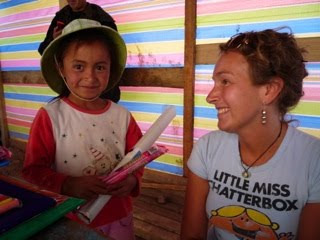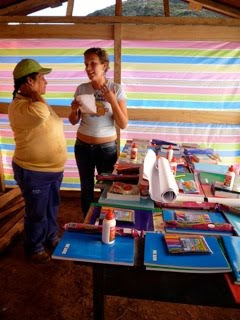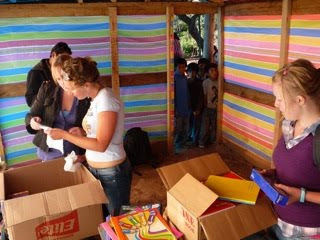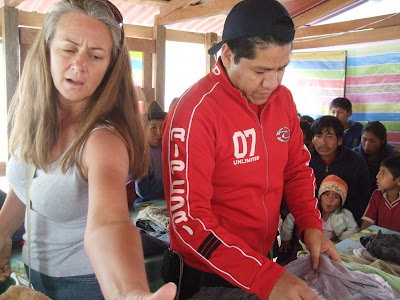Monday, March 29, 2010
Peru's Flood Victims: My Small Help
Sunday, March 28, 2010
School Supplies for Paucarbamba




Wednesday, March 24, 2010
Building a Comedor (Dining Room)
Saturday 20th March
Tuesday, March 23, 2010

Saturday, March 20, 2010
Productive Meeting
Tuesday 16th March

Leander and Carlos hard at work planning!
Meetings have been arranged this week with experts in micro-finance and agronomy, to help us get a clearer understanding of the options available for developing sustainable businesses for the flood affected community of Paucarbamba.
Wednesday, March 17, 2010
Visit to Arariwa (farming micro finance organisation)
Thursday, March 11, 2010
Incredible Work
Monday, March 1, 2010
Strange Peruvian customs: Peru
Saturday 27th February
We were invited to a fiesta that the community were having on Saturday night which was great fun and their way of saying thank you for the help we have given so far. The centre of the celebration was a pre-chopped tree which was decorated with plastic kitchen utensils (!).
Everyone forms a circle and dances round the tree with couples taking it in turns to chop at the trunk. Whenever anything falls off the tree the children run to collect it and when the whole tree falls it is a mad rush to grab the gifts!
Publicising the problems : Peru
Saturday 27th February
We were lucky enough to have David with us on Saturday. David is a documentary film maker from the
Image: David interviewing a local boy
A good feeling! : Peru
Saturday 27th February

After a mamouth shop in
Most of the children in the community of Paucarbamba lost everything and with school starting it was important that we helped provide them with books, pens, colours etc. It was a lovely feeling to be creating 22 piles of school things for the secondary age children and they were delighted with their gifts and are all now set for school.
As we were leaving the community a rainbow appeared…..
Cuy Research: Peru
Friday 26th February
Following on from the last blog entry, Carlos and I, accompanied by Nellida and her boyfriend (Nellida is a Cuy expert and an agronomist) visited a government run Cuy Farm close to
Presenting the idea: Peru

On Tuesday, Carlos, Eddy and I went to Paucarbamba to present the idea of the Cuy Farm(Guinea Pig Farm). Most Andean Campesinos (farmers) will have Cuy (guinea pigs) running around their house, close to the oven where it is warm. Cuy are a popular delicacy in the Andes in
One of our hopes for the community is that they become self sufficient through a Cuy Project. Cuy are ready to eat and sell after 2 or 3 months if reared properly and there is significant profit to be made which will help the community rebuild their houses and lessen their dependence on our food donations.
Carlos presented the plan and it was met with much enthusiasm. The name of the project is Cuylandia (guinea pig land!) and we still have more research to do but it was an encouraging start!








